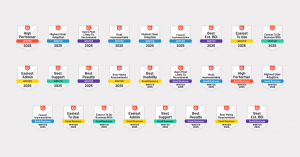Architectural projects demand precision, creativity, and seamless coordination across multiple disciplines and stakeholders. When project management goes off track, even the most brilliant designs can crumble under budget overruns, missed deadlines, and communication breakdowns.
Modern architecture demands more than just great design. Successful firms know that robust project management is key to turning creative ideas into profitable, well-run projects. Getting the fundamentals right helps teams stay ahead, deliver great work, and keep clients happy.
Why Strong Project Management is Crucial in Architecture
Architecture projects require careful coordination across designers, engineers, contractors, clients, and regulators. Each group has its own needs and timelines, and without strong project management, things can quickly fall out of sync, causing delays, extra costs, and frustrated teams.
Strong project management creates a structured framework that enables architectural teams to maintain creative focus while ensuring practical constraints are met. It provides visibility into project progress, resource allocation, and potential bottlenecks before they become critical issues. This proactive approach allows architects to make informed decisions that protect both design integrity and project profitability.
5 Common Project Management Challenges in Architecture
1. Scope Creep
Scope creep represents one of the most persistent challenges in architectural project management. Clients often request additional features, design modifications, or expanded services without recognizing the impact on timeline and budget. These seemingly minor adjustments accumulate over time, transforming manageable projects into overwhelming endeavors that strain resources and compromise profitability.
The creative nature of architectural work can inadvertently encourage scope creep, as designers may feel compelled to incorporate every client suggestion or pursue perfectionist ideals beyond the original agreement. Without clear boundaries and change management processes, projects spiral beyond their intended parameters.
2. Stakeholder Communication Silos
Architectural projects involve numerous stakeholders who must collaborate effectively despite different priorities, technical languages, and working styles. Communication silos develop when information fails to flow seamlessly between architects, engineers, contractors, and clients. These disconnects lead to misunderstandings, duplicated efforts, and conflicting decisions that derail project momentum.
Traditional communication methods often rely on email chains, separate software platforms, and manual updates that create fragmented information flows. Critical details get lost in translation, and team members work with outdated information that compromises decision-making quality.
3. Creating Unrealistic Budgets and Schedules
Architecture firms frequently struggle with accurate project estimation, leading to budgets and schedules that fail to reflect project realities. Optimistic projections may win contracts but create impossible expectations that ultimately damage client relationships and firm profitability. Inadequate historical data, insufficient contingency planning, and pressure to provide competitive bids contribute to these unrealistic projections.
Complex architectural projects involve numerous variables that can significantly impact costs and timelines. Without comprehensive data analysis and risk assessment, estimates become educated guesses rather than reliable projections.
4. Poor Risk Management
Architectural projects face many risks, including design changes, regulatory delays, material availability, weather conditions, and stakeholder conflicts. Firms that fail to identify, assess, and mitigate these risks can find themselves managing crises rather than preventing them. Reactive risk management consumes valuable resources and creates stress that impacts team performance and project outcomes.
In architecture, one issue can affect the whole project. A delay in approvals can push back construction, disrupt resource planning, and throw off the budget across every phase.
5. Forgoing the Use of Innovative Technology
Many architecture firms still use outdated project management methods that cannot keep up with today’s fast-paced, complex projects. Manual tasks, disconnected tools, and paper-based workflows slow things down and lead to bigger issues over time. Avoiding new technology puts firms behind and makes it harder to deliver a great client experience.
Modern project management tools provide a better way. They help simplify workflows, improve collaboration, and support smarter decisions. Firms that adopt these tools work more efficiently, reduce errors, and increase client satisfaction.
Key Strategies to Overcome These Challenges
Invest in the Right Project Management Software
Complete project management software transforms how architectural firms coordinate complex projects. Modern platforms integrate project planning, task management, budget monitoring, and progress tracking within one environment that eliminate information silos. These systems provide real-time visibility into project status, enabling proactive management of potential issues before they impact deliverables.
Advanced project management solutions offer customizable workflows that adapt to each firm’s unique processes while maintaining consistency across projects. Automated notifications, milestone tracking, and integrated calendars ensure that team members stay aligned with project objectives and deadlines.
Enhance Teamwork with Integrated Communication Tools
Effective collaboration takes integrated communication tools that connect all project stakeholders within shared digital environments. These platforms eliminate communication gaps by providing centralized spaces where team members can access current project information, share updates, and coordinate activities seamlessly.
Modern communication solutions integrate with existing software ecosystems, allowing teams to work within familiar applications while maintaining connectivity across all project participants. This integration reduces the friction that can prevent effective collaboration in complex architectural projects.
Utilize Budgeting Software
Creating accurate budgets and quotes means leveraging specialized software that simplifies the estimation process while ensuring precision and consistency. Modern budgeting platforms allow architectural firms to develop detailed project estimates using customizable templates, standardized rates, and automated calculations that reduce human error and improve accuracy.
These systems integrate seamlessly with project management workflows, allowing teams to convert approved quotes directly into project budgets with proper phase breakdowns and resource allocations. Advanced features include markup controls, fee structure management, and the ability to generate professional proposals that enhance client presentations and improve win rates.
Optimize Scheduling with Resource Allocation Software
Effective scheduling relies on resource allocation software that balances project demands with available capacity across the entire organization. These systems provide comprehensive visibility into staff availability, skills, and workload distribution, enabling managers to optimize assignments and prevent resource conflicts.
Intelligent scheduling platforms consider multiple variables, including project priorities, staff capabilities, client requirements, and deadline constraints, to create realistic timelines that maximize efficiency while maintaining quality standards. Automated resource leveling helps prevent team burnout and ensures consistent project delivery.
Minimize Risks with Real-Time Data
Proactive risk management depends on real-time data analytics that identify potential issues before they become critical problems. Modern platforms collect and analyze project data continuously, providing early warning systems that alert managers to emerging risks and performance trends.
Data-driven insights enable architectural firms to make informed decisions based on objective information rather than intuition or incomplete data. These analytics platforms transform raw project data into actionable intelligence that improves decision-making quality and project outcomes.
Seamlessly Navigate Architectural Project Management with Total Synergy
For over 25 years, Total Synergy has helped architecture and engineering firms take control of their projects and finances. Our project management platform is built specifically for A&E workflows, making it easier to manage tasks, improve collaboration, and boost profitability. Book a demo today to see how Total Synergy can support your firm.



